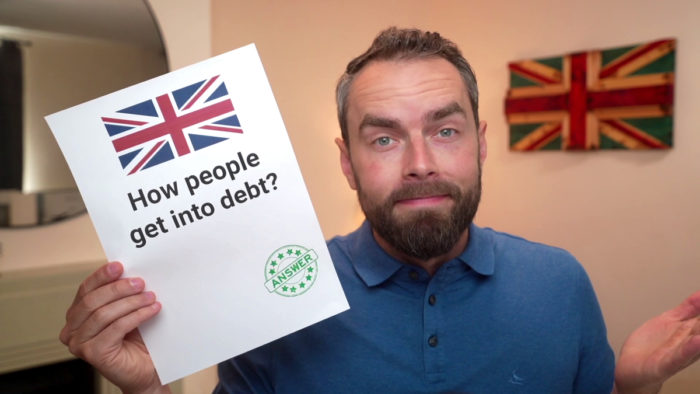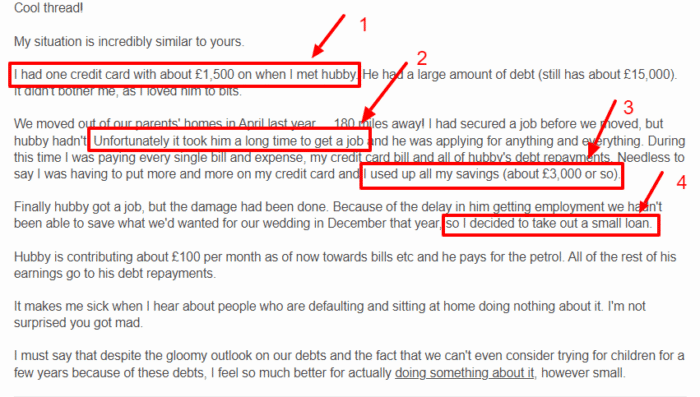How Do People Get Into Debt? Dangers to Look Out For
For free & impartial money advice you can visit MoneyHelper. We work with The Debt Advice Service who provide information about your options. This isn’t a full fact-find, some debt solutions may not be suitable in all circumstances, ongoing fees might apply & your credit rating may be affected.

For free & impartial money advice you can visit MoneyHelper. We work with The Debt Advice Service who provide information about your options. This isn’t a full fact-find, some debt solutions may not be suitable in all circumstances, ongoing fees might apply & your credit rating may be affected.
We know that understanding how you got into debt can be hard. Don’t worry; this article is here to help you. It will explain:
- The main reasons people fall into debt.
- The dangers of debt and how it can affect you.
- How to manage and avoid debt.
- Tips on how to pay off your debt.
- Answers to common questions about debt.
Debt can be scary and make you worry about your future. But you’re not alone. Each month, over 170,000 people visit our website to learn about debt solutions.
Our team has a lot of knowledge about debt; some of us have even had debt problems in the past. So, we’re here to help you learn about debt, so you can feel better about your money.
What Can Lead to Debt?

So often, we’re put in circumstances that have no other way around them. Some of these situations that lead to debt include the following:
1. Underemployment
Underemployment may seem like a short-term problem, but it actually has long-term effects on the money you hold.
If you’re unemployed – or feel like you’re underemployed – you should start looking for another job while keeping a well-balanced budget for the income you have.
You can’t really tell when you’ll find yourself a well-paying job, so it’s always recommended that you spend very little from your income to avoid running out of money and falling into debt.
2. Medical Expenses
Medical expenses are among the most common reasons that can run you out of money. We feel like it is a necessity that costs almost as much as a luxury.
And if you need to spend in this direction, you just have to. There’s no other way around it.
Here’s a fact: the problem of budget-exceeding medical expenses is so widespread, that hospitals have started sending patients with overdue bills to money collection agencies.
When you’re being put through this, and are taking loans, or making huge credit card transactions – you’re leading yourself to debt.
This is why I always advise that you save a good amount for emergency funds.
3. Debt From Education
Everyone has the right to a good education, but with the constantly hiking education costs, it seems like an impossible idea.
But, is it really? With improper budgeting, yes.
While many people look forward to a college education, not everyone plans for it. And that’s exactly what it needs.
To avoid huge college debts in future, it’s best to save up for your future fees from the very beginning.
So yes, good budgeting can save you a good amount of money that can be later used to aid your education.
4. Societal Pressure
Societal expectations, amplified by social media, drive individuals to seek validation through displays of material success.
This leads many people to make purchases beyond their means.
The pressure to keep up with perceived standards often results in accumulating debt to fit into the trending culture.
Avoid succumbing to online pressures. Prioritise creating and sticking to a realistic budget. Ask yourself whether purchases are needs or influenced wants.
How a debt solution could help
Some debt solutions can:
- Stop nasty calls from creditors
- Freeze interest and charges
- Reduce your monthly payments
A few debt solutions can even result in writing off some of your debt.
Here’s an example:
Situation
| Monthly income | £2,504 |
| Monthly expenses | £2,345 |
| Total debt | £32,049 |
Monthly debt repayments
| Before | £587 |
| After | £158 |
£429 reduction in monthly payments
If you want to learn what debt solutions are available to you, click the button below to get started.
Common Mistakes to Avoid – How Not to Get into Debt
We want you to know that while debts seem impossible to avoid, there still are ways to avoid some of them.
1. Reckless Spending Habits
Before looking into any other causes, let’s talk about the most important (and also the most avoidable) one.
A lot of people indulge in bad spending habits.
You might be spending too much on your clothing or your food without really noticing. Buying branded clothing items and dining out too often can burn a bigger hole in your pocket than you may think.
You need to cut down on your impulsive shopping patterns. Always prepare a list before you go to shop and make it a habit to stick to it no matter what.
2. Mismanaging Your Budget or Not Having One at All
Having a budget is not only one of the best ways to avoid debt, it is something you owe to your hard-earned income.
With an accurate budget, you will know how much you need to keep for your monthly necessities, like bills, etc., and how much you will be saving.
Then, with this saved amount, you can proceed to buy whatever you want.
Still, don’t spend all of your monthly savings. Instead, keep some for long-run crises, like medical emergencies, etc.
So, if you don’t have a budget, formulate one starting this month.
3. Not Having an Emergency Fund to Fall Back On
The reason why we advocate for extra saved money is because we know how bad it is not to have any emergency funds and just how life-saving it can be to have them.
Emergencies are obviously sudden, and a lot of times, their primary requirement is cash.
Whether it’s a sudden fee hike at your college or a medical emergency, your saved funds can save you from going into debt.
4. Misusing Credit Cards to Buy Things You Can’t Actually Afford
Before purchasing anything with your credit card, think through it: Can you afford it without a card?
If not, don’t buy it.
Credit cards are a very attractive choice when it comes to making such a hasty decision because you have to pay later, right?
Don’t forget that you still have to pay, even if it’s a month later. And if you can’t, debt will follow.
5. Having Too Many Credit Cards
Credit cards are a big responsibility, and can be mismanaged easily.
This is because credit cards allow people to spend more than their ability does.
With the ‘buy now, pay later’ deal, many people outspend their incomes and eventually go into debt.
For this very reason, we recommend that you keep no more than one credit card – unless you have an urgent reason.
The higher the number of credit cards, the higher is your chance of overspending.
People also often forget that interest rates can stack up! You can use my free interest calculator to stay ahead of the game and make sure that you keep your interest payments manageable.
This is a guidance tool only and not an assessment. For accurate interest calculations, contact the company issuing the credit. Do not rely solely on this calculator’s results.
6. Ignoring Early Signs of Credit Card Debt
A lot of people tend to ignore the early signs of credit card debt.
If you have a small outstanding bill, then it’s okay not to worry too much. But you shouldn’t completely abandon your concern.
This is because, at the end of the day, no matter how small of an amount you owe, you still have to pay it back.
You should formulate a balanced plan to pay it off to save yourself from stress.
In case you miss the deadlines, the recovery fees keep hiking, making the small concern a huge financial responsibility for you later. So, the earlier you pay them off, the better.
7. Mismanagement of Student Loans
Student loans are one of the loans that are almost impossible to avoid.
But with the right management and planning, you can avoid borrowing a huge loan, and also return the amount in a well balanced manner.
If people don’t plan out their education costs from the very start, they’ll have to take too huge of a loan to cover their college expenses.
On the contrary, some savings can help you decrease the amount of loan needed.
Similarly, if you’re able to formulate a good plan to pay it back, you might as well get rid of it without going through much stress.
Thousands have already tackled their debt
Every day our partners, The Debt Advice Service, help people find out whether they can lower their repayments and finally tackle or write off some of their debt.

Natasha
I’d recommend this firm to anyone struggling with debt – my mind has been put to rest, all is getting sorted.
Reviews shown are for The Debt Advice Service.
How Bad Can it Get? – Interests & Debt Recovery Fees
This straining process of debts doesn’t just involve the constant stress of the responsibility to pay off the owed money, it can even take years off your life.
According to most experts, a DTI higher than 36% means you’re too deep into debt.
This is when debt starts making your financial decisions for you – you can merely save up, have to limit your necessities, and even take more loans just to survive the previous crushing debts.
In fact, the more you keep yourself indebted, the higher your chance to fall deeper into constantly hiking interests and recovery fees.
In extreme cases – when you lose the ability to pay back at all – your lenders can take your case to the court.
However, you cannot go to jail just because you’ve failed to pay your debts – unless you’ve committed some sort of fraud in the process.


